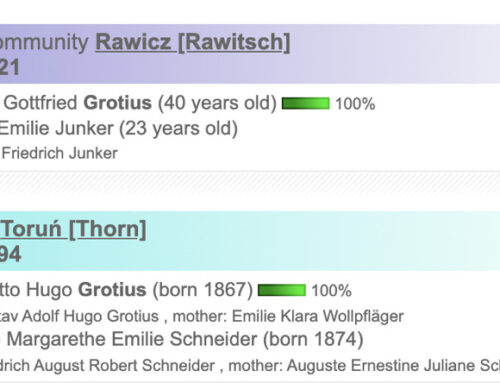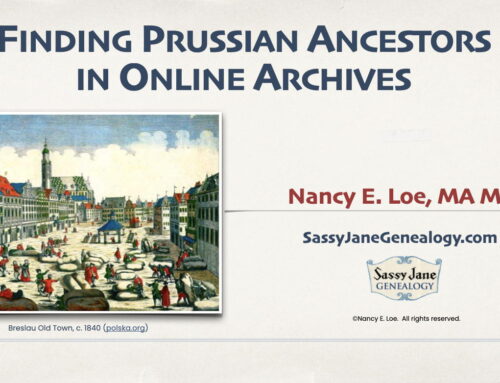Need help translating Hamburg Passenger List categories? Is your German a little rusty or perhaps even non-existent, like mine?
This post helps you decipher the categories of information that were recorded on the Hamburger Passagierlisten, 1850-1934. This database is a goldmine for European migration research.
The database includes images of the passenger lists digitized from microfilm in partnership with the Hamburg State Archive. The passenger lists are indexed by the “Hauptfürsorgestelle,” a training program for handicapped persons funded by the City of Hamburg.
About the Hamburger Passagierlisten, 1850-1934
Search the Hamburger Passagierlisten, 1850-1934 at Ancestry.com. Clerks for Hamburg-based steamship lines completed these forms. The lists contain information from emigrants just before they sailed for America.
Thus, the Hamburg passenger lists contain more specific information about places of residence before emigration than is found in the corresponding New York passenger arrival lists. Search both the departure lists from Hamburg, as well as the arrival lists in New York or other U.S. ports.
Ancestry helpfully notes that since the records are in German, it helps to search in German, and only the years 1877-1914 have been indexed at this point. They also suggest browsing the Handwritten Indexes, 1855-1934, if your ancestors have not yet been included in the index.
Hamburg Passenger List Categories

Before you decipher the German handwriting in a record you find, it helps to know what categories of information were used on the passenger list itself.
The questions asked of departing emigrants varied over time, but generally included the following:
-
Zuname (Surname)
-
Vorname (Forename)
-
Die zu einer Familie gehörenden Personen sind unter einander zu notiren und durch eine Klammer als zusammengehörig zu bezeichnen (Group family members together and designate using brackets)
-
Geschlect (Sex) mannlich weiblich (male female)
-
Alter (Age)
-
Bisheriger Wohnort (Previous place of residence)
-
Im Staate oder in der Provinz (State or Province)
-
Bisheriger Stand oder Beruf (Previous trade or profession)
-
Ziel der Auswanderung, Ort und Land ist anzugeben (Destination, specify place and country)
-
Zahl der Personen (Number of people)
-
Davon sind (Of these):Erwachsene und Kinder über 10 Jahre (Adults and children over 10 years)Kinder unter 10 Jahre (Children under 10 years)Kinder unter 1 Jahre (Children under 1 year)
Who Departed from Hamburg?
Ancestry notes that the passenger lists in this database
…include approximately 5 million records of individuals, approximately 80% of whom were destined for the United States. Ca. 475,000 traveled to South America, ca. 214,000 to Canada, ca. 100,000 to Africa, ca. 54,000 to Australia, and ca. 10,000 to Asian countries. Most of the lists include the last place of residence and often the place of birth as well.
About one-third of the passengers departing from Hamburg were Germans; the other two-thirds largely came from Eastern Europe, especially after 1880. Ancestry notes, “Among these were approximately 1.2 million people from Russia, Austria-Hungary, Romania, and other countries of southeastern Europe. The records also include about 750,000 Jewish immigrants from Russia, who sailed at this time from Hamburg to the United States.”
Knowing and translating Hamburg Passenger List categories helps you get more from this indispensable resource.





I cannot thank you enough for this post! It was tremendously helpful in solving a key piece to my paternal 2nd great-grandfather’s entry into the United States. My German is very rusty, though getting better, and your walkthrough was so helpful in navigating and translating much of the cursive German entries against the formal columns of the passenger list. This has opened a whole new door into my past. Thank you, again!
You’re welcome! I remember feeling lost looking at a Hamburg list for the first time, not knowing any German. Congrats on finding that needed passenger list, Dan.